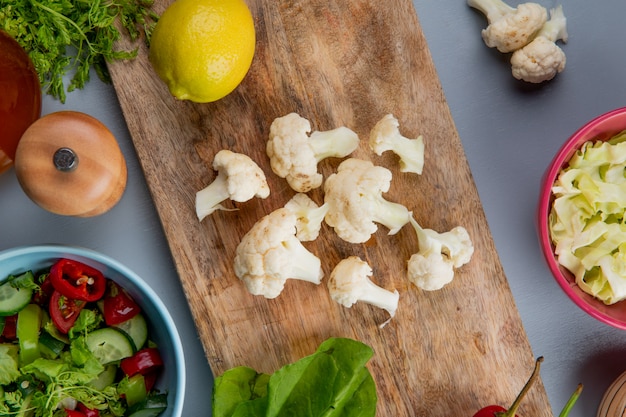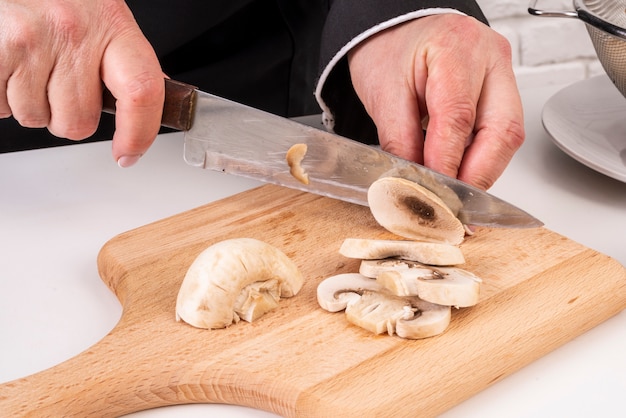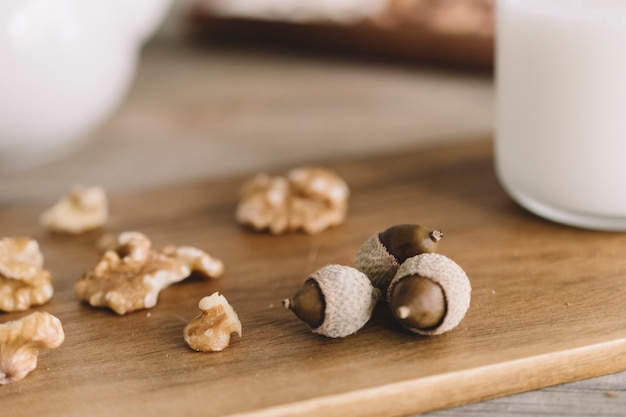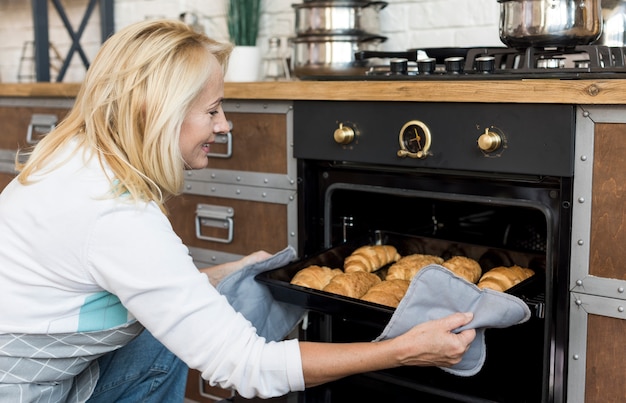I love mushrooms. They add a wonderful earthy flavour and texture to so many dishes. But, you know how it is, sometimes you buy a whole punnet of fresh mushrooms and end up with a few left over that start to go bad before you can use them. It's such a waste! That's why I started freezing them. Let me tell you, it's been a complete game-changer! Now I can enjoy those delicious mushrooms anytime, without worrying about them going bad.
Freezing mushrooms is a fantastic way to save money, reduce food waste, and always have a delicious ingredient on hand. They work beautifully in soups, stews, stir-fries, pasta sauces, and so much more. And the best part? They taste practically as good as fresh! It's all about understanding the best practices, and that's exactly what we're going to cover in this article.
Part 1: Choosing and Preparing Your Mushrooms: The Foundation for Success

1. Picking the Right Mushrooms: A Matter of Texture and Flavor
Not all mushrooms are created equal when it comes to freezing. Some types hold up beautifully, while others lose their texture or flavour. Based on my experience, these are the absolute best mushrooms for freezing:
- Button Mushrooms: These are the most common type for good reason. They freeze beautifully, maintaining their shape and texture, making them perfect for a variety of uses.
- cremini mushrooms (Baby Bellas): These have a richer, more intense flavour than button mushrooms, making them excellent additions to stir-fries, sauces, and even grilled dishes. They hold up well when frozen.
- Shiitake Mushrooms: These have a unique, meaty texture and a flavour that's perfect for Asian-inspired dishes. They freeze well, too.
- Oyster Mushrooms: They have a delicate flavour and a soft texture that's delightful in stir-fries, soups, and even omelettes. They freeze well but might break apart slightly during the process.
- Portobello Mushrooms: These are the giants of the mushroom world, and they're fantastic for grilling. However, they can get a bit tough when frozen. If you're using them for soups or stews, freezing them is fine. But, for grilling, fresh is best.
Here's a tip: I steer clear of freezing chanterelles and morels. Their delicate texture can be negatively affected by freezing, and they're best enjoyed fresh. Also, it's best to enjoy wild mushrooms fresh as well. They have a higher risk of contamination, making them less suitable for freezing.
2. Cleaning and Prepping Your Mushrooms: The Secret to Maximum Flavor
Mushrooms are a bit tricky to clean. They absorb water easily, which can dilute their flavour. I prefer to give them a quick wipe with a damp cloth rather than soaking them. A little bit of dirt? A small brush works wonders. It's all about keeping their natural flavour intact.
Once your mushrooms are clean, it's time to prep them for freezing. The prep depends on how you plan to use them. For soups or stews, simply slice or chop them into the size you need. But for stir-fries or pasta sauces, sauté them first. This helps them retain their texture and flavour, making them delicious when you defrost them. Here's my go-to method:
- Heat a little olive oil in a pan over medium heat.
- Add your mushrooms and cook until they're soft and lightly browned.
- Drain off any excess moisture before freezing.
Part 2: Freezing Methods: From Simple to Savvy

1. Freezing in a Single Layer: Easy, Effective, and Prevents Clumping
This is the simplest and most effective way to freeze mushrooms. Spread your prepared mushrooms in a single layer on a baking sheet lined with parchment paper. This prevents them from sticking together, making them easy to separate later. You can also use a freezer-safe container, but be sure to leave some space between the mushrooms so they don't clump together.
2. Freezing in Bags: Saving Space and Maximizing Efficiency
If you're short on freezer space, freezer bags are your friend. I use resealable freezer bags – they're easy to store and label. Place your prepared mushrooms in the bags, pressing out as much air as possible before sealing. Label them with the date and type of mushroom so you can easily identify them later.
3. Blanching Before Freezing: Preserving Colour and Flavor
This method is slightly more involved, but it's fantastic for preserving the colour and flavour of delicate mushrooms. You'll quickly blanch them in boiling water for a few seconds and then transfer them to ice water to stop the cooking process. This helps prevent the mushrooms from becoming mushy when frozen. It's not necessary for all mushrooms, though. The more robust ones, like button and cremini mushrooms, will be fine without blanching. For delicate mushrooms like oyster mushrooms, blanching is worth the extra effort.
Part 3: Using Your Frozen Mushrooms: Bringing Deliciousness to Every Meal

Now that your mushrooms are frozen, it's time to use them! You can add them directly to soups, stews, and sauces without thawing. But for stir-fries or pasta sauces, it's best to thaw them first. This helps them cook evenly and prevents them from becoming too watery. You can thaw them in the refrigerator overnight or by placing them in a bowl of cold water for about 30 minutes.
Remember, frozen mushrooms might not be quite as vibrant as fresh ones, so you might need to add a little extra flavour to your dishes. A splash of soy sauce, a squeeze of lemon juice, or a sprinkle of herbs can really liven things up. And, I've found that adding a pinch of salt at the end of cooking brings out the best in frozen mushrooms.
Part 4: Understanding the Shelf Life of Frozen Mushrooms: Making the Most of Your Stock
Frozen mushrooms can last for about 6 to 8 months in the freezer, but they're best used within 3 to 4 months for the best flavour and texture. After that, they might start to lose their texture and become a bit mushy. So, use them up as soon as possible for the best results.
Part 5: Troubleshooting Common Freezing Problems: Preventing Mushiness and Freezer Burn
1. Mushy Mushrooms: The Importance of Proper Freezing
Mushrooms can sometimes become mushy if they're not frozen properly. To avoid this, freeze them in a single layer and prevent them from sticking together. Use parchment paper, freezer bags with as much air removed as possible, or freezer-safe containers with space between the mushrooms.
2. Freezer Burn: The Enemy of Flavor and Texture
Freezer burn is a common problem with frozen foods, and it can affect the texture and flavour of mushrooms. To prevent it, store your mushrooms in airtight containers or freezer bags, pressing out as much air as possible before sealing. If you notice any signs of freezer burn, like discoloration or ice crystals, it's best to discard those mushrooms.
3. Thawed Mushrooms: A Word of Caution
If your mushrooms have thawed and refrozen, they'll likely become mushy. You can still use them in soups, stews, or sauces, but they won't be as good for stir-fries or pasta sauces. It's generally best to avoid refreezing thawed mushrooms. If you need smaller portions, freeze them in smaller batches to avoid thawing more than you need at once.
Part 6: FAQs: Answering Your Questions About Freezing Mushrooms
1. What are the best mushrooms for freezing?
Button mushrooms, Cremini mushrooms (Baby Bellas), Shiitake mushrooms, and Oyster mushrooms all freeze well. Avoid freezing Chanterelles, Morels, and wild mushrooms. Their delicate texture and potential for contamination make them less suitable for freezing.
2. How long do frozen mushrooms last?
Frozen mushrooms can last for about 6 to 8 months in the freezer, but they're best used within 3 to 4 months for the best quality and flavour.
3. Do I need to thaw frozen mushrooms before cooking?
You can add frozen mushrooms directly to soups, stews, and sauces without thawing. However, it's best to thaw them first if you're using them for stir-fries or pasta sauces to prevent them from becoming too watery and cook evenly. You can thaw them in the refrigerator overnight or by placing them in a bowl of cold water for about 30 minutes.
4. Can you freeze cooked mushrooms?
Yes, you can freeze cooked mushrooms. It's a great way to preserve their flavour and texture. Sauté the mushrooms with some oil until they're soft and lightly browned, then drain off any excess moisture before freezing in a single layer on a baking sheet. Once frozen, transfer them to a freezer-safe container or bag.
5. How do I know if frozen mushrooms are bad?
Frozen mushrooms should be free of any signs of freezer burn, such as discoloration or ice crystals. If you notice any of these signs, it's best to discard the mushrooms. Also, pay attention to the smell. If they have an off smell, it's best to avoid them.
Part 7: A Quick Recap: The Secrets to Perfect Frozen Mushrooms
Freezing mushrooms is a fantastic way to save money and reduce food waste. To make the most of your frozen mushrooms, follow these simple tips:
| Choose the right mushrooms. | Button mushrooms, Cremini mushrooms, Shiitake mushrooms, and Oyster mushrooms are great for freezing. |
|---|---|
| Clean and prep them properly. | Wipe them with a damp cloth, slice or chop as needed, and sauté them if desired. |
| Freeze them correctly. | Freeze in a single layer on a baking sheet lined with parchment paper or in freezer bags. |
| Use them within 3 to 4 months. | Frozen mushrooms are best used within 3 to 4 months for the best quality and flavour. |
Freezing mushrooms might seem a bit intimidating at first, but it's actually quite easy. Once you've got the hang of it, you'll be a pro in no time! You'll be surprised at how simple it is to enjoy those delicious mushrooms anytime you like.
Everyone is watching

Prime Rib Roast Cooking Time Chart: Per Pound Guide
Cooking TipsPrime rib roast. Just the name conjures images of lavish dinners, crackling fires, and hearty laughter. It’s ...

How Long to Bake Potatoes in the Oven (Perfect Every Time)
Cooking TipsBaked potatoes are a staple in my kitchen. They're incredibly versatile, delicious, and surprisingly easy to m...

Perfect Rice Every Time: The Ultimate Guide to Cooking Rice
Cooking TipsAs a self-proclaimed foodie, I've always been a bit obsessed with rice. It's the foundation of countless cuisi...

The Ultimate Guide to Cooking Asparagus: Tips, Techniques, and Recipes
Cooking TipsAsparagus. The mere mention of this spring delicacy conjures up images of vibrant green spears, crisp and burs...

Ultimate Guide to Cooking the Perfect Thanksgiving Turkey
Cooking TipsThanksgiving. Just the word conjures up images of overflowing tables laden with delicious food, the scent of r...
